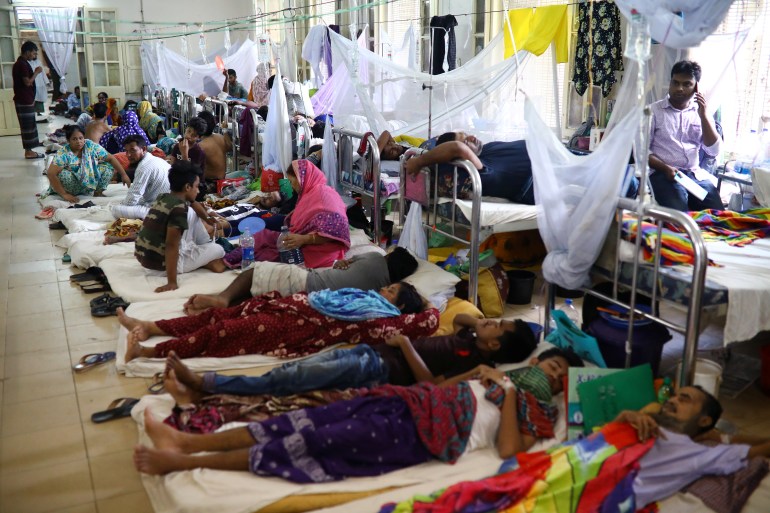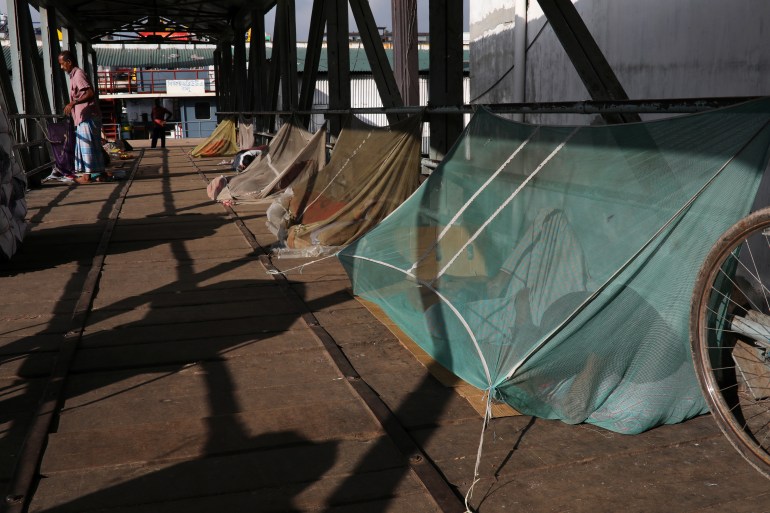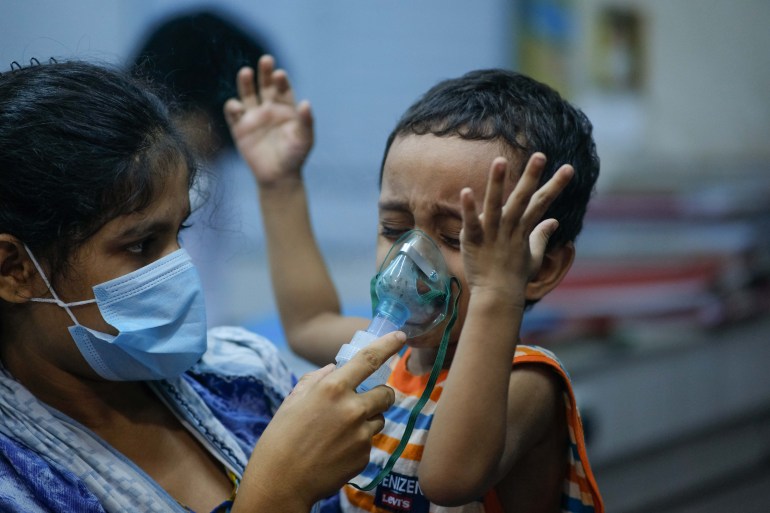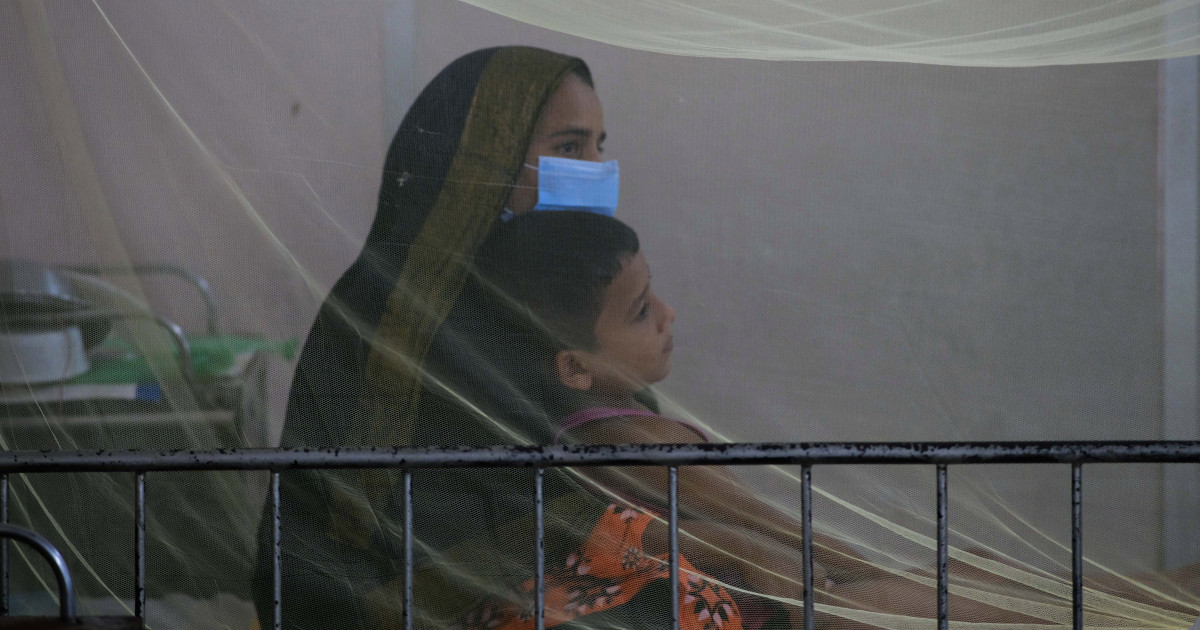Dhaka, Bangladesh – A sharp spike in dengue cases is straining Bangladesh’s fragile healthcare system, which is already battered by a worsening coronavirus crisis in the country.
Just this month, 1,920 people were diagnosed with the mosquito-borne disease till Friday, marking a more than 600 percent jump in cases from June when 272 cases were reported.
According to the Directorate General of Health Service (DGHS), a total of 2,292 patients have been diagnosed with dengue this year, including at least three deaths.
 A children’s hospital in Dhaka saw an increase in number of dengue cases in past few weeks [Mahmud Hossain Opu/Al Jazeera]
A children’s hospital in Dhaka saw an increase in number of dengue cases in past few weeks [Mahmud Hossain Opu/Al Jazeera]Almost all the dengue cases, barring about 70, have been found in Dhaka, Bangladesh’s sprawling capital, home to about 17 million people.
The dengue outbreak has put further pressure on Bangladesh’s healthcare, which is already on the brink of a collapse due to a vicious third wave of the coronavirus.
On Thursday evening, 239 COVID-19 related deaths were reported across the country in the past 24 hours, raising the death toll to 20,255.
During the same period, 15,271 new coronavirus cases were reported, taking the total caseload to 1,226,253, according to the DGHS.
 Dengue infected patients are seen hospitalised at the Sir Salimullah Medical College Hospital in Dhaka [Mohammad Ponir Hossain/Reuters]
Dengue infected patients are seen hospitalised at the Sir Salimullah Medical College Hospital in Dhaka [Mohammad Ponir Hossain/Reuters]Similar symptoms
Bangladesh witnessed its worst-ever dengue outbreak in 2019 when it recorded more than 100,000 cases and 179 deaths.
There was a lull last year when 1,405 patients were diagnosed across the country, with seven killed according to the DGHS data.
This year, however, the situation is complicated by the fact that COVID-19 and dengue present similar symptoms, making their illnesses more difficult to diagnose.
And most hospital beds and Intensive Care Units (ICUs) have been taken up by coronavirus patients, making it difficult for patients with a severe case of dengue to get admitted to a facility.
 Homeless people sleep under the mosquito net to protect themselves from dengue in Dhaka [Mohammad Ponir Hossain/Reuters]
Homeless people sleep under the mosquito net to protect themselves from dengue in Dhaka [Mohammad Ponir Hossain/Reuters]Last week, when Afsarul Haque first found his fever had reached 102F, he thought he was infected with the novel coronavirus.
The 38-year-old banker immediately called a private lab to get his COVID-19 test done. A day later, the result came out as negative.
His fever, however, kept getting worse as did his headache.
“The thought of catching dengue didn’t flash in my mind at all,” Haque told Al Jazeera.
“But one of my relatives asked me to get a dengue test. I did and the test result was positive.”
Haque has been staying home as per his doctor’s suggestion and has been taking medicines.
 The dengue outbreak has put further pressure on Bangladesh’s healthcare [Mahmud Hossain Opu/Al Jazeera]
The dengue outbreak has put further pressure on Bangladesh’s healthcare [Mahmud Hossain Opu/Al Jazeera]“I am now on my way to recovery. But the mental trauma I had gone through was exhausting.”
While Haque was lucky, Sayeeda Nasrin Bably was not. The 35-year-old university teacher died of dengue on July 7 – the first dengue death recorded this year.
Bably’s brother Golam Hafiz told Al Jazeera she was taken to a private hospital where the doctors suspected it was COVID-19.
“She was later given a dengue test and the result came out positive,” said Hafiz.
As Bably’s condition deteriorated, she was admitted to the hospital’s ICU. “On July 7, she had a brain stroke and died,” her brother said.
Deadly variant of dengue
The WHO says dengue is caused by a virus with four distinct strands. Recovery from infection by one provides lifelong immunity against that particular strand but subsequent infection by other strands increases the risk of developing severe dengue.
In Bangladesh, a large number of dengue patients this year are being infected with DEN-3, a variant of the dengue virus which can increase mortality risk, according to Dr Tahmina Shirin, director of the country’s Institute of Epidemiology, Disease Control and Research (IEDCR).
In previous years, Bangladesh witnessed outbreaks of DEN-1 and DEN-2 strands but this year DEN-3 is more prevalent, said Shirin, adding that DEN-3 and DEN-4 strands are considered deadly and cause plasma leakage, respiratory distress and organ impairment in patients.
Dr Md Robed Amin, director of the DGHS Non-Communicable Disease Control (NCDC) unit, told Al Jazeera that this year, the dengue cases are high because of what he called a “wave pattern.”
“Dengue cases increase every alternate year. We saw massive dengue cases in 2019, so there was a probability of increasing dengue cases in 2021,” he said.
Amin said entomologists earlier this year had warned of the growth in dengue cases in the country.
“We (DGHS) gave copies of this report to civic bodies to take appropriate action, such as controlling mosquito population by conducting drives and running awareness campaigns,” he added.
According to entomologist Kabirul Bashar’s projection, the dengue situation in Bangladesh will worsen in August but he appreciated the efforts taken by the Dhaka administration in checking the spike.
“I have seen the two city corporations of Dhaka get active in controlling mosquito’s population. If their activities go on in full swing, then the dengue cases might decrease,” he said.
Brigadier General Jobaidur Rahman, the chief health officer of Dhaka North City Corporation, told Al Jazeera they have already started a special cleanliness drive across the capital.
“We are taking the increases in dengue cases very seriously. We are working at full force to thwart any further increase in cases in August,” he said.
Additional reporting by Mubtasim Fuad in Bangladesh
